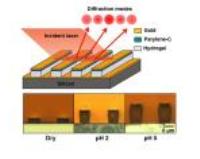Feb 14 2011
A research team led by Cagri Savran, an associate professor teaching mechanical engineering at Purdue University, has developed a diffraction-based sensor that is both biological and chemical. It is robust, cost -efficient and almost inertial.
 Purdue's Hydrogel Sensor
Purdue's Hydrogel Sensor
It has been fabricated from hydrogel, a gelatinous material that has been cut into thin stripes. It has the ability to expand or contract in response to the acidity in the environment. It can measure the pH value to reveal whether and how much a liquid is acidic or basic, of substances that are found in liquids. It can be deployed to monitor and control environments prevailing in water bodies and also to monitor glucose levels in blood. The hydrogel does not dissolve in water, and the elevated stripes or diffraction grating, is covered with gold on both the surfaces of the stripe and the spaces between them.
The research findings written by researcher Chun-Li Chang t was presented at the IEEE Sensors 2010 Conference in November and have also been published in the minutes of the conference. The sensor analyzes a beam of laser light that reflects off the gold covering. However, the reflections from the stripes interfere with those from the spaces between them in a diffraction pattern that alters according to the height of the stripes. This registers minute alterations that occur in the hydrogel movement, thus determining changes in pH. The pH is based on a scale from 0 to 14, where 0 is the most acidic and 14 the most basic values. The sensor can record alterations smaller than 1,000th on the pH scale. The work is ongoing.